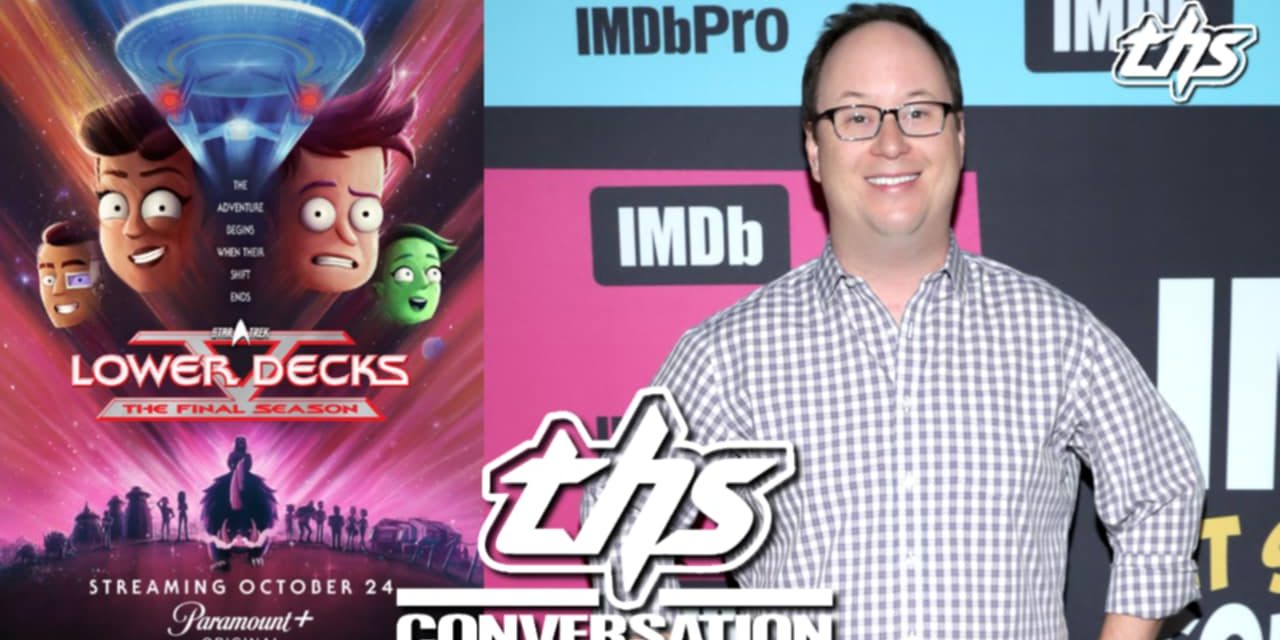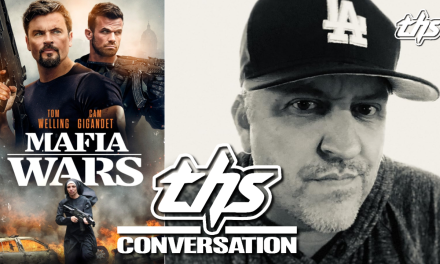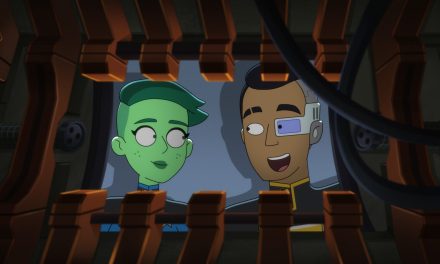Star Trek: Lower Decks is a full-throated love letter to Star Trek that works because it doesn’t require deep fandom to appreciate. The tight character work, hilarious comedy, and inventive sci-fi adventure make Lower Decks a great show for fans of sci-fi in general, regardless of how much they know or love Star Trek. For five seasons, Lower Decks has been a great addition to the world of animation, regularly delivering on all fronts.
While the series is coming to a close (for now, at least), the fifth season finale “The New Next Generation” is an ideal send-off. Not necessarily a farewell so much as a “bye for now,” Lower Decks‘ series finale is a testament to the elements that have made it a must-watch for five seasons. During an interview with That Hashtag Show, Star Trek: Lower Decks creator Mike McMahan discussed the motivations behind the season’s overarching storyline, the biggest surprises he encountered over the course of the series, and teased possible directions the Ceretios could go if the show ever returns down the line.
RELATED: ‘What We Do In The Shadows’: Kayvan Novak And Kristen Schaal Talk Season Finale
A Chapter Closing, Not A Story Ending

THS: Starting off, congrats on five seasons on Star Trek: Lower Decks and a hell of a final season!
Mike McMahan: Thank you! I’ve loved Lower Decks. I love this season. It’s hard to pick a favorite. They’re all my favorites, but it’s weird that we only have one more episode that everybody’s gonna get to watch for the first time, you know? Then we’ll move into the Star Trek era that other shows always encounter, which is the rewatch era. I get to find out if people like it five years from now, which will be interesting.
Something I loved about this season was the way it built on five years of adventures. There’s a genuine trust between the characters.
Yeah, I love that too. It’s fun because when that suspicion and doubt is not on the table as a story element, it pushes you to find other stakes. It makes you feel like you’re not going backward. These characters are all growing. Freeman growing into a Commander for a whole star base that’s on the edge of a new frontier… You’ve got Ransom! Going from such a chucklehead in season one… I tried to seed it for forever.
If I did my job right on Ransom, you love him. He’s a good officer, but he’s kind of frustrating. That’s an exciting captain to me. That’s a fun show to get to see. love where everybody ends up, and I do love this finale is a celebration of the show. It’s the crew, it’s the ship, it has all these alternate dimension versions of the Cerritos, it’s got classic Klingon baddies. It’s just so fun.
Something else great about this year was the way it highlighted all these different people and characters. There was the Upper Decks episode. There were personal timelines and internal dramas. Why was it important to broaden the scope of the final season instead of making it a greatest hits run of past years?
I knew that it was going to be a final season. I was hoping it wasn’t. But you can’t control that stuff. So I needed to accelerate some stuff I wanted to do down the line, so the multiverse was really helpful with that. But at the same time, I’d worked on Rick and Morty and didn’t just want to do more multiversal stuff like that. So I really tried to figure out a way to be — it’s not Mirror Universe, it’s not parallels. It’s another way that Star Trek could look at the multiverse. Doing it in a way of exploration is always going to read as Star Trek. That always feels right. Making the big bad of the season a version of Lily Sloan accidentally causing this multiverse damage felt very Star Trek. That’s what science feels like.
I just really wanted to make sure that the front half of the season felt like a normal continuation of Lower Decks. I didn’t want to take the last 10 episodes, a whole fifth of the series, and make it a goodbye the entire time. The front half of the season really feels like what people have always loved about Lower Decks, just moving forward with the characters, and having these funny Star Trek adventures. Then halfway through the season, I started accelerating some stuff I would have done a couple seasons down the line. I wanted to work with Jolene, I wanted to work with Garrett, I wanted to work with Brent. We are so careful about the timeline that we’re in, so I needed the multiverse to be able to explain that. It all just kind of fit together.
The easiest part of the season came about once we came up with the multidimensionality. It’s having Boimler meeting a version of himself that he aspires to be like. So of course he would go too far with that. That’s who Boimler is. It was also seeding all the little things all season, like Rutherford having problems with the Cerritos and not realizing it’s the implant. It was stuff like Tendi coming back from Orion and being a little bit more aggressive, being a little bit more competitive, because now she’s letting her Orion side come through a little bit more. Her Mistress of the Winter Constellations-ness causes issues with Senior Science Officer stuff.
Introducing Olly… all the stuff I love about Lower Decks is in this season. It feels like the end of a chapter. It feels like the end of an era. If we did more of it, it would be the same, but different — and that feels really honest and good. It feels like we left everybody in a way that says it feels final, but not that we’re shutting a lid on it. These characters are going to continue doing this stuff. You can imagine how fun it would be. If we ever get picked up again, we can continue doing stuff. And now we all know what the pitch for it would be. But at the same time, with these five seasons, we went through something together. That should feel really good.
RELATED: Wallace & Gromit: Vengeance Most Fowl | Directors On Bringing Back These Timeless Characters
Honoring The Past (And Looking To The Future) With Star Trek: Lower Decks

All of the Ceretios Crew have evolved in really exciting ways. Looking back to the earliest days of the show, which members of the cast would you say has surprised you the most over the years?
I think Tendi is the biggest surprise to me. Originally, I wanted her to be a different view of Orion that we hadn’t seen before. Her first day on the Cerritos is the pilot, so she’s coming in with the audience. Pretty quickly, we realized that the characters can’t refer to old Star Trek episodes and then not grow a bit when they’re experiencing their stories. When we started to allow the characters to grow, we found Tendi’s relationship with her family and her sister. We found her relationship with being Orion, and it was really fun. It’s not something I planned from the beginning, but every time we did it, I was like, God, I love this stuff.
I think with Mariner, I didn’t know we’d be allowed to do the “Inner Fight” episode. Revealing her backstory with Seto and Ricardo and that felt really special to me too. That’s something that I had cooking in the background. But usually in a comedy, you don’t have a therapy episode in a cave with a Klingon. Lower Decks is all of that. It’s the funny episodes, it’s the serious episodes.
It’s the legacy characters returning along with new characters. Once the show could fit all of that stuff that I really love, that really surprised me. Ransom is another one! He went from just being a bro meathead, but very quickly you realize you can’t be just a bro meathead and get to this level. You actually do have to be a good Officer too. I just really like that aspect.
I’ve also got to say, as a low-key Rutherford/Tendi shipper, I appreciate the little moment at the end of the finale where there’s a further hint of that direction.
Rutherford getting embarrassed for the first time in a casual, Tendi touch would definitely be a story. They are best friends. They’re in love with science and with engineering together. That is the core of their relationship. That’s how they are. That’s how I would write them. But Rutherford not being in control of his emotions, almost as an anti T’Lyn, who is fully in control of her emotions… the idea of Rutherford needing T’Lyn to advise him moving forward on how to deal with not having a thing that helps you regulate emotions.
It’s not that he has heightened ones. It’s just he’s had training wheels on for the whole time with his implant. Getting to tell stories with him like that are the stories that I want to tell. I want to explore what memories are going to surface, because that implant isn’t there anymore. Exploring how his engineering acumen changes, finding out he’s a better engineer without it, all that stuff. But also his relationship with Tendi, how he has to protect their friendship. That’s really fun stuff that I hope I get to do something with someday.
You’ve really gotten to be additive to this world, especially with stuff like the gate to the multiverse and all these characters and elements. As a fan of Star Trek and as a creator in general, what does it mean to you to have left so many marks on this franchise?
It’s a part of the universe, but it also feels like something that could have always existed, which always is a great Lower Decks way to be. I don’t want to add something that makes it intrinsically not feel like Star Trek. I think Deep Space Nine and Voyager both did that differently… That stuff is so cool. I wanted it to feel like that. I wanted it to feel like it doesn’t change anything we know about Star Trek, but if you told a show there, it would give you the opportunity for a lot of interesting stories.
That’s how I feel about what we did with Ferenginar. That’s how I feel about what we did with Kronos, with our Klingon farmer. I think we did the same thing with Orion. I love filling in these little gaps with this little Dino DNA. That it feels like it’s always kind of been there, but now you’re getting to see it. You’re getting to see Cetaceans officers. Worf is a Klingon officer, let me have Layshon be a Tamarians officer. Let Olly be Greek god officer!
I love what Star Trek’s already done, and I love seeing how we can expand that while never treading on what came before. Instead we celebrate it and see this stuff that we like, and just take it to another degree. Plus we’re funny the whole time. I had a blast these 50 episodes. I couldn’t be happier.
Star Trek: Lower Decks is now streaming on Paramount+
For more on TV, make sure to check back to That Hashtag Show.




![Director Alejandra Márquez Abella Talks New Film, ‘A Million Miles Away’ [Interview]](https://www.thathashtagshow.com/wp-content/uploads/2023/09/project_20230911_1032515-01-440x264.png)
![Aaron Abrams & Director Eli Craig talk ‘Clown in a Cornfield’ and the importance of original stories [Interview]](https://www.thathashtagshow.com/wp-content/uploads/2025/05/project_20250506_0126091-01-440x264.png)